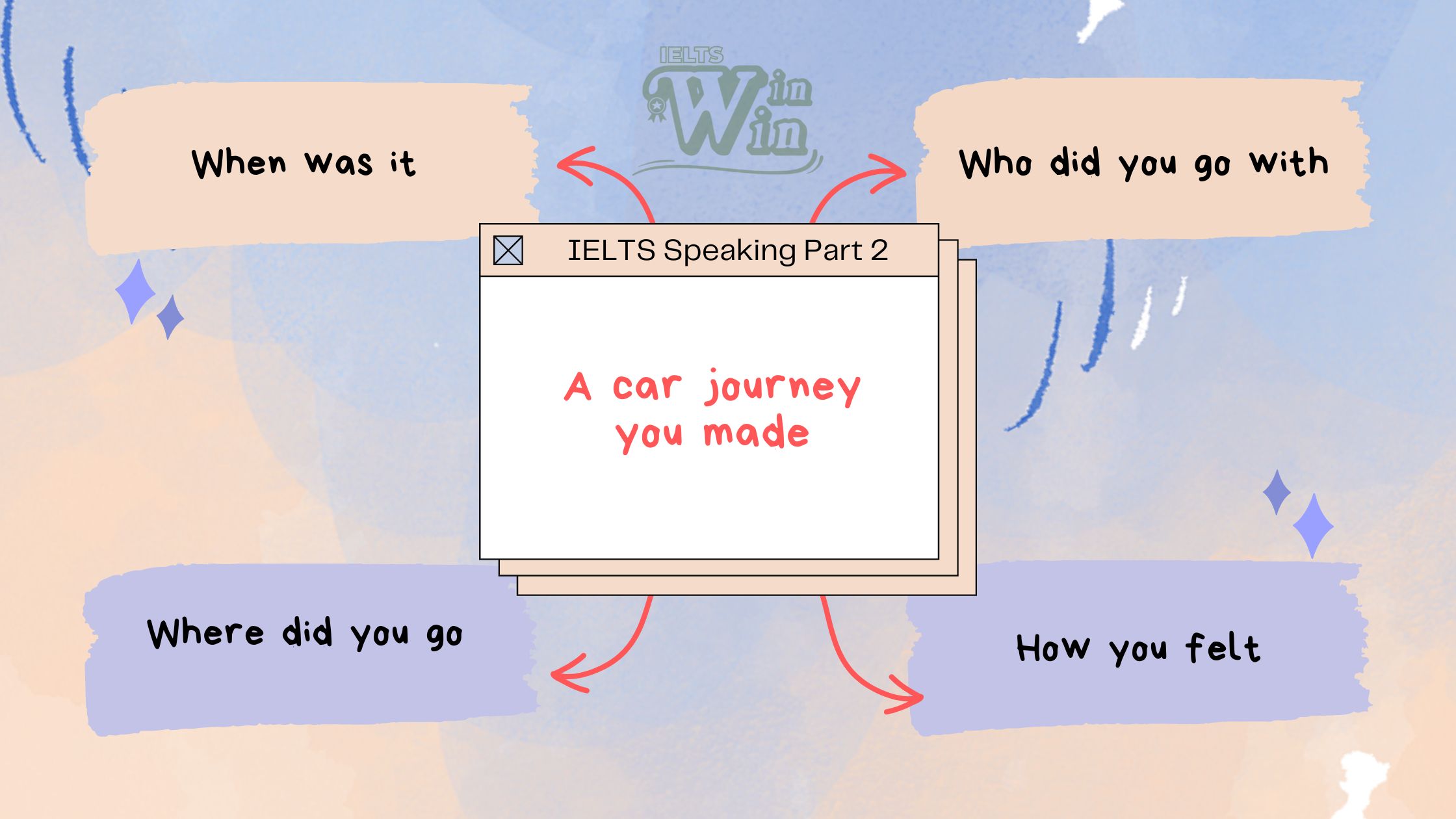✨Part 2: A car journey you made
- When & with whom
- Where & the distance
- Did you enjoy it
A few months ago, I embarked on an exciting car trip to the beautiful coastal city of Vung Tau in Viet Nam. Accompanied by my family with my elder brother at the helm, we set off on a memorable adventure, eager to explore the scenic landscapes and soak in the seaside charm.
According to my vague memory, Vung Tau is located about 120 kilometers from our residential area, making it an ideal destination for a weekend getaway. The journey was peppered with lively conversations, laughter, and the occasional sing-along to our favorite tunes. We made frequent stops at roadside cafes, where we savored delicious local snacks and sipped on steaming cups of coffee. I think these moments of respite allowed us to fully immerse ourselves in the journey and appreciate the surrounding beauty. Once we arrived, we wasted no time in exploring the city's attractions. We not only visited the famous White Villa, a picturesque colonial mansion with panoramic views of the sea but also took a cable car ride up to the summit of Nui Lon, where we were rewarded with breathtaking vistas of the coastline and the city below. Throughout our stay, we indulged in the fresh seafood that Vung Tau is renowned for. From succulent grilled prawns to mouthwatering fish dishes, each meal was a culinary delight that satisfied our taste buds and immersed us in the local flavors.The car journey to Vung Tau was an absolute joy. It provided us with an opportunity to spend quality time together as a family, discover new landscapes, and create cherished memories.
The car journey had allowed us to experience the beauty of Vung Tau firsthand, forging unforgettable memories that we would cherish for years to come.
- Embarked (/ɪmˈbɑːrkt/) - v. - bắt đầu, lên tàu, lên đường
- Coastal (/ˈkoʊstəl/) - adj. - thuộc về ven biển, ven bờ biển
- Accompanied (/əˈkʌmpənid/) - v. - đi kèm, đi cùng
- Memorable (/ˈmɛmərəbl/) - adj. - đáng nhớ, khó quên
- Eager (/ˈiːɡər/) - adj. - háo hức, hăm hở, nóng lòng
- Residential (/ˌrɛzɪˈdɛnʃəl/) - adj. - thuộc về khu dân cư, khu dân cư
- Destination (/ˌdɛstəˈneɪʃən/) - n. - điểm đến, địa điểm du lịch
- Getaway (/ˈɡɛtəweɪ/) - n. - kỳ nghỉ, chuyến đi nghỉ ngơi
- Peppered (/ˈpɛpərd/) - adj. - rải rác, trải đều
- Occasional (/əˈkeɪʒənl/) - adj. - thỉnh thoảng, đôi khi
- Roadside (/ˈroʊdˌsaɪd/) - n. - lề đường, bên đường
- Savored (/ˈseɪvərd/) - v. - thưởng thức, thưởng thức vị ngon
- Respite (/ˈrɛspaɪt/) - n. - sự nghỉ ngơi, sự giải lao
- Immerse (/ɪˈmɜrs/) - v. - đắm mình, đắm chìm
- Picturesque (/ˌpɪktʃəˈrɛsk/) - adj. - đẹp như tranh vẽ, đẹp như bức ảnh
- Colonial (/kəˈloʊniəl/) - adj. - thuộc thuộc địa, thuộc địa thuộc địa
- Mansion (/ˈmænʃən/) - n. - biệt thự, lâu đài, dinh thự
- Panoramic (/ˌpænəˈræmɪk/) - adj. - toàn cảnh, bao quát
- Breathtaking (/ˈbreθteɪkɪŋ/) - adj. - ngoạn mục, kinh ngạc
- Vistas (/ˈvɪstəz/) - n. - cảnh quan, tầm nhìn
- Indulged (/ɪnˈdʌldʒd/) - v. - nuông chiều, thỏa mãn
- Succulent (/ˈsʌkjələnt/) - adj. - mọng nước, ngon miệng
- Prawns (/prɔːnz/) - n. - tôm hùm
- Mouthwatering (/ˈmaʊθˌwɔːtərɪŋ/) - adj. - ngon, đầy cám hứng
- Culinary (/ˈkʌlənɛri/) - adj. - thuộc về ẩm thực, ẩm thực
- Firsthand (/ˈfɜːrstˈhænd/) - adj. - trực tiếp, trực tiếp trải nghiệm
- Forging (/ˈfɔrdʒɪŋ/) - v. - tạo lập, xây dựng, phát triển.
Part 3
✨Do you think cars are becoming more popular in Vietnam?
Yes, cars are indeed becoming more popular in Vietnam. With the country's economic growth and increasing disposable income, more people are able to afford cars. The improved road infrastructure and availability of financing options have also contributed to the rising popularity of cars in Vietnam. Additionally, the desire for convenience, comfort, and mobility has driven the demand for personal vehicles.
- Disposable (/dɪˈspoʊzəbl/) - adj. - có thể thải bỏ sau khi sử dụng, dùng một lần
- Infrastructure (/ˈɪnfrəstrʌktʃər/) - n. - cơ sở hạ tầng, cơ sở vật chất
- Mobility (/məʊˈbɪləti/) - n. - tính di động, khả năng di chuyển
- Demand (/dɪˈmænd/) - n. - nhu cầu, yêu cầu
✨What are the advantages of cars?
Cars offer several advantages. Firstly, they provide convenience and flexibility, allowing individuals to travel at their desired time and destination without relying on public transportation schedules. Cars also offer privacy and comfort, particularly during long commutes or in extreme weather conditions. Additionally, cars can be seen as a status symbol and provide a sense of independence and freedom. They are often considered more suitable for carrying heavy loads or transporting multiple passengers compared to other modes of transportation.
- Several (/ˈsɛvrəl/) - adj. - một vài, một số
- Flexibility (/ˌflɛksəˈbɪləti/) - n. - tính linh hoạt, khả năng thay đổi
- Transportation (/ˌtrænspərˈteɪʃən/) - n. - phương tiện vận chuyển, sự vận chuyển
- Commutes (/kəˈmjuts/) - n. - các chuyến đi làm, đi làm nhà về
- Independence (/ˌɪndɪˈpɛndəns/) - n. - sự độc lập, sự tự do
- Freedom (/ˈfriːdəm/) - n. - sự tự do, quyền tự do
- Loads (/loʊdz/) - n. - số lượng, khối lượng
- Passengers (/ˈpæsəndʒərz/) - n. - hành khách, người đi trên xe
✨What are the disadvantages of cars?
Cars have certain disadvantages as well. One major concern is the negative impact on the environment. Cars contribute to air pollution through emissions, which can harm human health and contribute to climate change. The high dependency on cars also leads to traffic congestion, increased fuel consumption, and noise pollution in urban areas. Moreover, the cost of purchasing, maintaining, and fueling a car can be significant, especially for lower-income individuals. Additionally, car accidents and road safety issues pose a risk to both drivers and pedestrians.
- Impact (/ˈɪmpækt/) - n. - tác động, ảnh hưởng
- Environment (/ɪnˈvaɪrənmənt/) - n. - môi trường, tự nhiên
- Emissions (/ɪˈmɪʃənz/) - n. - khí thải, chất thải
- Dependency (/dɪˈpɛndənsi/) - n. - sự phụ thuộc, sự ỷ lại
- Congestion (/kənˈdʒɛstʃən/) - n. - sự tắc nghẽn, sự ùn tắc
- Consumption (/kənˈsʌmpʃən/) - n. - sự tiêu thụ, sự sử dụng
- Pose (/poʊz/) - v. - đặt ra, gây ra, tạo ra
- Pedestrians (/pəˈdɛstriənz/) - n. - người đi bộ.
✨What can be done to reduce the negative impacts of cars?
To mitigate the negative impacts of cars, several measures can be implemented. Firstly, promoting the use of public transportation, such as buses and trains, can help reduce the number of cars on the road and alleviate traffic congestion. Encouraging carpooling and ridesharing services can also contribute to reducing the overall number of vehicles. Implementing stricter emissions standards and promoting the use of electric or hybrid vehicles can help reduce air pollution. Developing efficient urban planning strategies that prioritize pedestrian-friendly infrastructure and promote alternative modes of transportation, such as cycling and walking, can also contribute to reducing car dependency.
- Mitigate (/ˈmɪtəɡeɪt/) - v. - giảm thiểu, làm giảm nhẹ
- Measures (/ˈmɛʒərz/) - n. - biện pháp, cách thức
- Implemented (/ˈɪmplɪmɛntɪd/) - adj. - đã thực thi, đã triển khai
- Alleviate (/əˈliːvieɪt/) - v. - giảm bớt, làm dịu bớt
- Carpooling (/ˈkɑrpuːlɪŋ/) - n. - chia sẻ chuyến đi bằng ô tô
- Ridesharing (/ˈraɪdˌʃɛrɪŋ/) - n. - chia sẻ chuyến đi, dịch vụ chia sẻ xe
- Overall (/ˈoʊvərɔːl/) - adj. - tổng thể, toàn bộ
- Strategies (/ˈstrætədʒiz/) - n. - chiến lược, kế hoạch
- Pedestrian-friendly (/pəˈdɛstriən ˈfrɛndli/) - adj. - thân thiện với người đi bộ
- Infrastructure (/ˈɪnfrəstrʌktʃər/) - n. - cơ sở hạ tầng, cơ sở vật chất
- Alternative (/ɔːlˈtɜːrnətɪv/) - adj. - thay thế, lựa chọn khác
- Cycling (/ˈsaɪklɪŋ/) - n. - đạp xe
- Dependency (/dɪˈpɛndənsi/) - n. - sự phụ thuộc, sự ỷ lại
✨Is it important to develop public transport?
Yes, developing public transport is crucial for several reasons. Firstly, it helps reduce traffic congestion by providing an alternative mode of transportation for individuals who would otherwise use private cars. Efficient and well-connected public transport systems can lead to shorter travel times, increased accessibility, and improved mobility for all residents, including those who cannot afford or choose not to own cars. Additionally, public transport is generally more environmentally friendly compared to individual car usage, as it can accommodate a larger number of passengers per vehicle and contribute to reduced emissions. Developing public transport also promotes social equity by providing affordable transportation options for all segments of society.
- Otherwise (/ˈʌðərwaɪz/) - adv. - nếu không, nếu không thì
- Well-connected (/wɛl kəˈnɛktəd/) - adj. - được kết nối tốt
- Accessibility (/əkˌsɛsəˈbɪləti/) - n. - tính tiếp cận, tính dễ dàng tiếp cận
- Residents (/ˈrɛzɪdənts/) - n. - cư dân, người dân
- Environmentally (/ɪnˌvaɪrənˈmɛntli/) - adv. - về môi trường, liên quan đến môi trường
- Accommodate (/əˈkɑːmədeɪt/) - v. - đáp ứng, cung cấp cho
- Social equity (/ˈsoʊʃəl ˈɛkwəti/) - n. - công bằng xã hội
- Segments (/ˈsɛɡmənts/) - n. - các phân đoạn, các đoạn
✨What kinds of cars do people in Vietnam prefer?
In Vietnam, there is a preference for smaller and more fuel-efficient cars. This is mainly due to factors such as affordability, ease of maneuverability in crowded urban areas, and lower fuel costs. Hatchbacks and sedans from popular brands such as Toyota, Honda, Hyundai, and Ford are commonly seen on Vietnamese roads. However, the preferences can vary depending on individual needs and preferences, with some opting for larger SUVs or luxury vehicles.
- Preference (/ˈprɛfərəns/) - n. - sự ưa thích, sự lựa chọn
- Fuel-efficient (/ˈfjuːəl ɪˈfɪʃənt/) - adj. - tiết kiệm nhiên liệu
- Affordability (/əˌfɔːrdəˈbɪləti/) - n. - tính giá cả phải chăng, tính khả năng chi trả
- Maneuverability (/məˌnuːvərəˈbɪləti/) - n. - tính linh hoạt, khả năng di chuyển linh hoạt
- Hatchbacks (/ˈhætʃˌbæk/) - n. - xe đa dụng
- Sedans (/sɪˈdænz/) - n. - xe sedan
✨At what age should people be able to get a driving license?
The legal driving age in Vietnam is 18 years old for cars and motorcycles. At this age, individuals are considered to have reached a level of maturity and responsibility necessary for safe driving. However, it's important to note that driving skills and experience can vary among individuals, and it's essential for all drivers to undergo proper training and education before obtaining a driving license. Additionally, there may be specific requirements and restrictions for new drivers, such as the need for a provisional license or supervised driving for a certain period.
- Motorcycles (/ˈmoʊtərsaɪkəlz/) - n. - xe máy
- Maturity (/məˈtjʊrəti/) - n. - sự chín chắn, sự trưởng thành
- Essential (/ɪˈsɛnʃəl/) - adj. - cần thiết, quan trọng
- Undergo (/ˌʌndərˈɡoʊ/) - v. - trải qua, chịu đựng
- Restrictions (/rɪˈstrɪkʃənz/) - n. - sự hạn chế, giới hạn
- Provisional (/prəˈvɪʒənl/) - adj. - tạm thời, lâm thời
- Supervised (/ˈsuːpərˌvaɪzd/) - adj. - được giám sát, được giám định
Xem thêm các bài viết về Speaking Part 2 và 3 ở đây bạn nhé
Đừng ngần ngại để lại thông tin hoặc liên hệ với chúng mình qua địa chỉ sau đây để IELTS WinWin có thể hỗ trợ tốt nhất cho bạn nhé!
Địa chỉ: 118 Nguyễn Xuân Khoát, P. Tân Thành, Q. Tân Phú, TP. Hồ Chí Minh.
Fanpage: IELTS WinWin
Zalo: 0965 439 239 – 085 301 8788
Website: ieltswinwin.com



